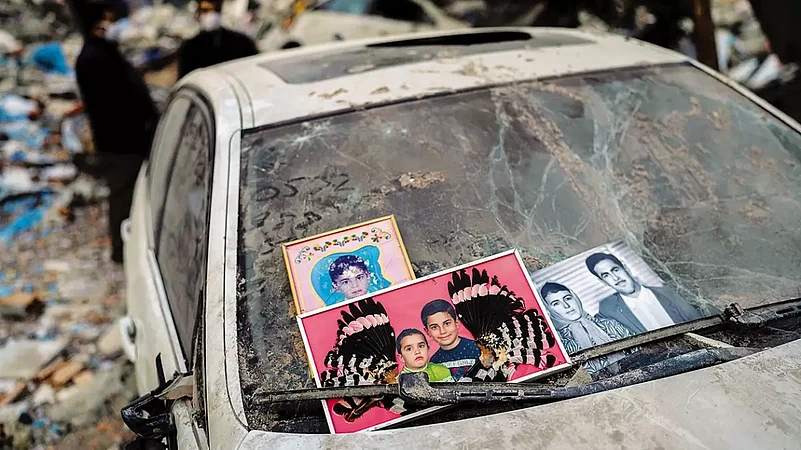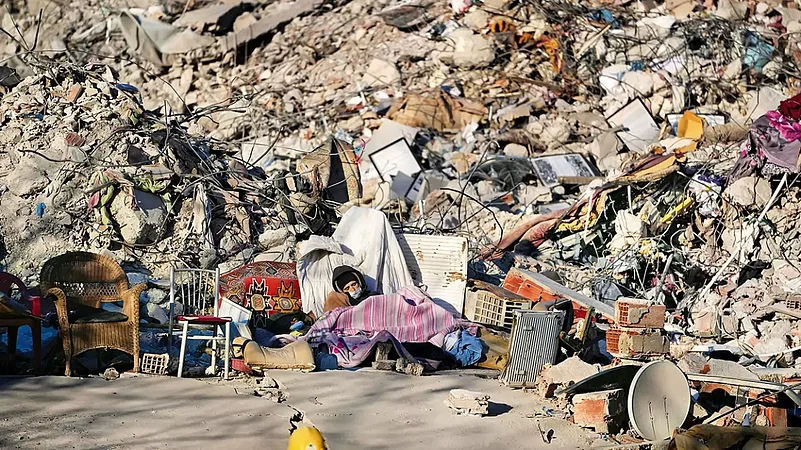With his bare hands, Yusuf Caliska, who had opened a clothing store in his hometown of Nurdagi in Kahramanmaras¸ province in southern Türkiye, just a few months ago, after moving from the capital Ankara, is trying to clear the rubble to find the bodies of his parents. He is lucky to have survived the earthquake but it has turned his store and his house to rubble and with them his fortune. Under the debris lie his parents who could not get out fast enough to save themselves.
At 4:17 am (local time) on February 6, the first quake, measuring 7.8 on the Richter scale, with its epicentre in the nearby province of Gaziantep struck, followed by another 7.5 magnitude quake whose epicentre was in the town of Pazarcık, just a few kilometres from Caliska’s home. The town of Pazarcık, one of the oldest human settlements and, until a few days ago, an attraction for historians, anthropologists and archaeologists, has been erased from history. Only piles of rubble remain.
Debris is everywhere on the streets of the provincial capital, also called Kahramanmaras¸, which lies on the foothills of snow-capped mountains. People have stopped crying and, amid the foul smell of rotting corpses, can be seen pleading with rescue teams to retrieve the bodies of their loved ones. The sight is simply heart-breaking. Those who manage to recover the dead and pay their last respects consider themselves lucky.
Unlike the 1993 Latur earthquake, the 2001 Bhuj earthquake or the 2005 Kashmir earthquake, which were confined to a few districts, the February 6 earthquake affected 10 southeastern provinces of Türkiye, namely Kahramanmaras, Hatay, Osmaniye, Gaziantep, Sanliurfa, Diyarbakir, Malatya, Killis, Adana and Adiyaman, as well as five provinces in Syria—Latika, Idlib, Aleppo, Raqqah and Al-Hasakah.
In Türkiye alone, the destruction covers an area of nearly 100,000 sq km, affecting over 13 million people. The distance between Adana and the other affected locations in Diyarbakir is about 600 km, so the scale of the relief and containment effort is gigantic and requires a large number of trained personnel. Even if a rescue team of 10 people is deployed for 1 sq km, it will take a million trained personnel to reach every corner. “Even if the whole world responded to the earthquake in Türkiye, there would not be enough help right now,” says Brock Mayer of the American Volunteer Rescue Team, which consists of 11-12 people and three trained K9 dogs.

So far, 35,000 bodies have been recovered, but the death toll continues to rise as rescue teams sift through the rubble. “So far, the focus has been on rescuing people who are under the rubble. Normally, such an operation is called off after 72 hours and it is assumed that no more life is possible. But even after a week, we are still recovering live bodies, even those of infants as young as a few months old,” says Yunus Sezer, chairman of the Agency for Disaster Management (AFAD).
Sazer says the agency, with the help of nearly 238,500 rescue workers from 99 countries, including India and Pakistan, will continue the operation for several more days before clearing the rubble and recovering bodies. More than 158,000 people have already been evacuated.
The limits of human resistance
Sibel Kaya, a 40-year-old woman, was rescued from the rubble of a five-storey building in Islahiye district of Gaziantep province, after spending 170 hours under the rubble. Another rescue miracle happened when teams rescued 60-year-old Erengul Onder in Besni district, Adiyaman province, after 166 hours. Seven-year-old Mustafa was rescued in Hatay province by teams from Konya province after being trapped under the rubble for 163 hours. Nafize Yilmaz, 62, was rescued from the rubble in Nurdagi in the same province after 163 hours. Even a two-month-old baby was found alive under the debris.
Across the border in Syria, rescue services have already abandoned operations because there were no signs of life and they did not have access to trained men and machines due to the complex situation in the conflict zone.
Speaking to Outlook, Caliska says that when the bed began to shake, he grabbed his wife to get out. “I was only a few minutes away from the building but it felt like I had walked for years to get there. What I found was just rubble,” he says. But within seconds, the building collapsed, burying his parents underneath. Some distance away, the building where his brother lived was also in ruins and there was no trace of his brother’s family or nephews.
Caliska’s story is echoed in all 10 provinces. In the nearby prosperous province of Gaziantep, with its eponymous capital, Aslan Kar, a government official, says he pulled out the bodies of his parents from the rubble.
“I pulled out eight relatives of mine with my bare hands. No one was there except me and my friends. I understand that rescue teams cannot reach everywhere given the extent of the devastation,” he says.
Businessman Abdulla Odabasi says that his apartment was undamaged but we were told that all the buildings in the city were unsafe and had to be demolished. In the freezing weather, sitting outside his tent, he is uncertain about his future, although President Recep Tayyip Erdoğan, who visited the city, promised to rebuild their homes.
In the city of Antakya in nearby Hatay province on the shores of the Mediterranean Sea, a 12-storey Renaissance complex, with 250 apartments, was being advertised as a luxury housing project until a few days ago. The hoardings were all over the city inviting buyers. It was completely brought down by the quakes.
While building codes in Türkiye are very strict, allowing only earthquake-resistant apartment buildings and prohibiting the construction of single houses, city governments in the affected regions are believed to have relaxed regulations in recent years for political reasons. Most city councils in these areas belong to political parties opposed to Erdoğan’s Justice and Development Party (AKP).
Erdoğan’s future at stake
The quake occurred at a time when Erdoğan is waging his most difficult political battle against a resurgent opposition. Elections are scheduled for May 14, but the massive destruction and devastation caused by the earthquake could lead to a postponement of the date.
The Opposition Iyi Party (Party of Good) and the Kurdish People’s Democratic Party (officially abbreviated as HDP in English) have a strong presence in the region. The leader of the Iyi Party, Meral Aksener, also running as a joint opposition candidate against Erdoğan, said that waste in the disaster area was out of control. She warned of the danger of disease.
“These piles of garbage will attract rodents after a while. Then the next phase will be an epidemic,” she added, recalling that some 10,000 people were killed during the cholera outbreak that devastated Haiti’s infrastructure in 2010. Filiz Kerestecioglu, an HDP MP, says tents were still needed in many places and that several villages in the disaster zone are still waiting for help. Nearly 100 people, including some of the contractors allegedly responsible for the collapsed buildings, have been arrested across the country.
One positive aspect of the devastation is the political rapprochement and warming of relations between Türkiye and Greece and also between Türkiye and Armenia. Greece was the first country whose rescue team arrived in Hatay province due to its proximity and Greece’s Foreign Minister, Nikos Dendias, came to oversee operations. The border between Armenia and Türkiye was opened after 30 years so that the relief and rescue operations could flow.
The total cost of reconstruction will probably not be known for some time, but according to Ferid Belhaj, World Bank vice president for the Middle East and North Africa, reconstruction in Türkiye and Syria is likely to consume several billion dollars. In its preliminary estimates, the Turkish Business and Economic Association estimates that $70.75 billion will be needed to build houses alone. Another $10.4 billion will be needed to compensate for the loss of national income, and $2.9 billion to replace lost work days.
(This appeared in the print edition as "The Horror, The Grief, The Despair")
Iftikhar Gilani in Ankara and Kahramanmaras
Iftikhar Gilani is a journalist currently based in Ankara, Türkiye



























